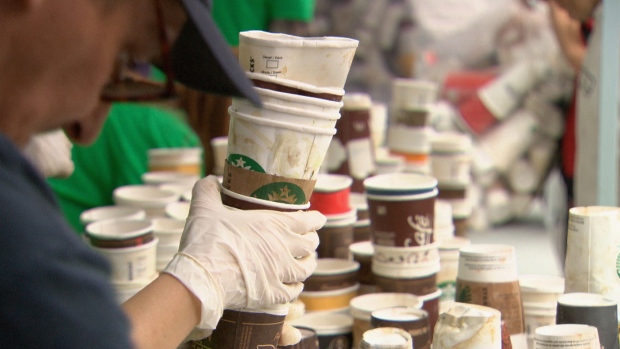During the midterm season coffee is my best friend. As much as I wish I had time to sit in and enjoy my coffee, I simply do not have enough time and end up getting a coffee to go in that handy paper cup…. Not knowing how much damage it causes to our planet.
Waste problems around paper cups have been acknowledged as one of the main environmental issues in large city like Vancouver. In Vancouver, around 2.6 million cups are being thrown away every week, which accounts for 22% of the garbage in Vancouver.
Why has nothing been done if the problem is so obvious?
As we seek convenience, cost, and quality in coffee, many people prefer the convenience of buy-drink-throw cycle rather than carrying a bulky travel mug all day, which is a common struggle which many of us experience including myself. In addition, the incentive to bring in one`s own travel mug is relatively small (Starbucks only provides around 10-cent discount for bringing your own cup); which consequently make people prefer convenience over cost.
What are possible solutions to reduce paper cup waste?
People first need to deepen their understanding about various issues which paper cups are causing. University of Victoria has done an interesting campaign where they collected all the paper cups they could find in the garbage on campus. The intent of this campaign was to show the students the amount of paper cups being thrown away on campus every day. Even though the campaign did not pose any actual solution to the problem, it was an effective way to create awareness regarding the amount of waste generated within the campus.
Another extreme solution is to ban the use of paper cups. While it will be difficult to entirely ban paper cups, the city of Vancouver has been working on such initiatives and regulations to reduce paper cup wastes. For instance, the city has implemented programs for businesses to opt-out from distributing the one-use cups and put financial pressure on such businesses. The aim is for businesses to realize the fact where “They’re paying for things to hand to their customers that their customers will throw away within 20 minutes.” These enterprises should understand that there are various other effective options to provide similar services in more economically and environmentally friendly ways.
Benefits we receive from reducing waste is significant at both individual and business level. And in order to do so, consumers and businesses need to rethink about the convenience and cost balance, and start focusing on benefits which sustainable and cost effective solutions can bring to us in the future.
